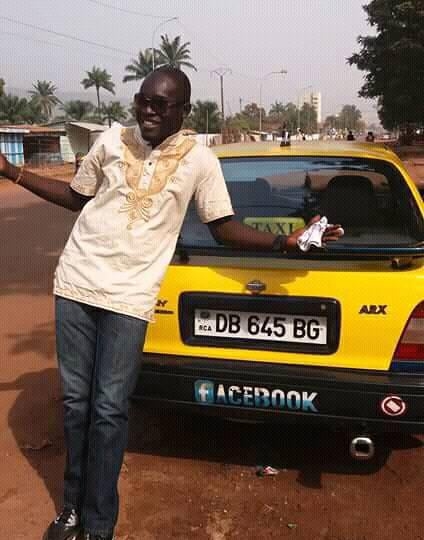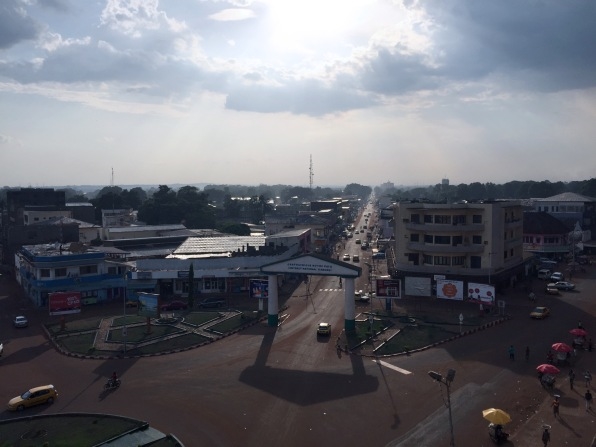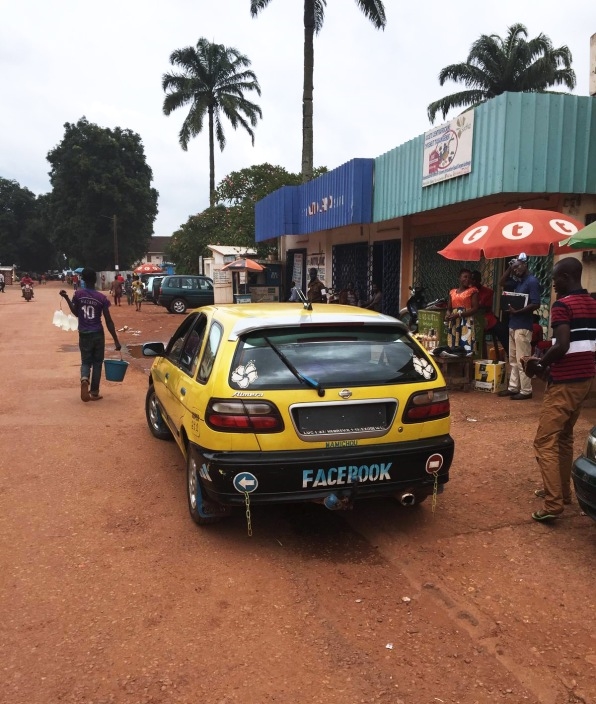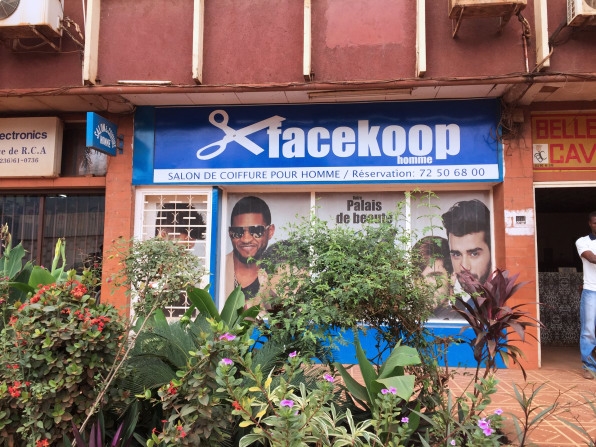Getting around Bangui isn’t always easy. The roads in the capital of the Central African Republic are not as congested with traffic jams as other big African cities, but they are still a buzzing beehive of yellow cabs, UN and NGO vehicles, the occasional UN tank, and a hoard of Chinese-made motorbikes from brands like HaoJue, Qlink, Royal, and Daylong. These ubiquitous and incalculable two-wheeled squadrons in particular are a source of many accidents—next to the cars from the MINUSCA peace-keeping mission which also account for their fair share of collisions and are equipped with an unforgettable caterpillar-like beep tone when in reverse mode.
Add to this an overall fragile security situation affecting the whole population—across the country, a four-year-old civil war rages on—and the rules imposed on any foreign workers who are not lucky enough to have their own car. For visitors, many of whom tend to be rather skeptical and risk-averse, reliable and safe transportation is a real conundrum.
Enter 28-year old entrepreneur Gracien, better known to everyone as Facebook. In just five years he’s successfully managed to build a thriving taxi business in one of the world’s most fragile countries. He now boasts a fleet of five cars, 11 drivers, and a growing client base now numbering some 250 customers.

I learned about Facebook through word of mouth. Being in Bangui for a few months was too brief a span to buy a car, and hiring a car with driver did not work out. So, as many passer-throughs, I was referred to Facebook.
Becoming Facebook
The first time his taxi showed up at my house the security guards would not even let it enter the compound. I saw two guys sitting in the car. In a leap of faith and under pressure to make it to my dinner appointment I got inside the car.
Facebook introduced himself and explained that since I was a new customer, he came himself to pick me up, establish trust, and introduce his associate, a cab driver that regularly worked with him, so that next time he could send the driver by himself. What followed was an animated presentation of an elaborated pricing system, wherein Facebook described the different tariffs per ride and per hour—and explained that once you are part of the circle of trust, you’d get a discount too.
Not long after Gracien got his high school diploma in 2012, CAR’s latest crisis hit the country after a coalition of armed rebel groups overthrew the president. Amid continued fighting among an array of militia groups, thousands have been killed and hundreds of thousands displaced. Elections in 2016 provided a glimmer of hope, but since then, the situation has deteriorated.
Without many options to pursue his education, Gracien tells me, he decided to get his driving permit and started working as a driver for an NGO. When the organization had to close down its operation in December 2012 due to the security situation, he decided to become a taxi driver.
Initially, it was temporary, and he used someone else’s car. Then, in February 2013, as he was making plans to acquire the car he was driving, the vehicle was seized by the rebels. Gracien continued with a borrowed car. His daily route often took him from the city center to the PK 5, both a commercial hub and residential neighborhood. He had customers from everywhere, locals and international travelers and expats working in CAR, with the latter making up around 80% of his client base.

At the time, gunshots were going off throughout the city. “I told people to stay at home and I had the courage to go out,” he says. So he offered home delivery services for people who were too afraid or not able to leave the house. Steadily, he established a reputation in the neighborhood, and built his network. The residents of the PK5 community admired him, having seen what he’d done during the crisis, when he had the courage to bring sick people to the hospital and deliver food and supplies to those people kept at home by the violence.
Eventually, Facebook managed to secure a car rental contract with someone that he would reimburse over a period of 13 months to become the owner of his own taxi. This time, at the end of the contract period the car was his.
Now that he had his own car, he painted his own “Facebook” logo on the car’s rear bumper. Why Facebook? After seeing so many diverse people get in his car, he thought of Facebook, which to him meant a place that connects people and allows them to share.
“This is my name, ” Facebook tells me as I sit beside him on one of our trips across the city. “I want people to call me Facebook. I am a place that unites people from everywhere.”
Soon, “that door of opportunity” opened, he says. One day, he picked up a new passenger, a humanitarian worker, who soon started teasing Facebook, even challenging him, about the quality of his service. “He tested my mindset, and he found me somehow super nice.”
The conversation was a turning point. Before he had met the humanitarian worker, he says, he did not always respect client appointments. But from this chance connection, Facebook picked up on some key business ethics like always being on time, creating trust, and networking.

He emphasizes his “good mindset.” “I don’t steal. If someone forgets something in my car, I return it. When someone is drunk, I take care of them.”
And people know the Facebook brand; with familiarity, trust comes more easily. To be sure, in the CAR—where internet access is still limited in many places—trust in Facebook the company may be less tenuous than it is in the U.S. and Europe, where various recent data-related scandals have, among other things, cast new doubt on Facebook’s trustworthiness. Yet, awareness of the internet’s, and social media’s, use of big data to manipulate opinions and discourse is starting to increase in Africa. With services like “free basics,” for many in Africa, the internet is Facebook and Facebook is the internet. Meanwhile, in many countries on the continent, there are few privacy regulations or laws to protect freedom of expression online and user privacy.
However, in the context of Bangui, trust in Facebook, the transport service, is also about seeing something familiar that triggers that notion of human trustworthiness. After all, the concern when trying to get around the city is less about loss of private data than the loss of, well, one’s life.
As Facebook started applying various lessons in trust, confidentiality, and timeliness, the word of his service spread. His growing client base orders his services largely by phone and pays by the hour, per kilometer or per ride. It is also possible to hire a cab for the whole day. The normal taxi tariff per ride in Bangui is fixed at 1,500 CFA (US$2.70), and Facebook charges only a little more (2,000 CFA) for the added value and quality of his services. He says that some of his clients have even suggested that he increase his prices to better match his service.
Facebook’s taxi operation has allowed him to continuously grow his business. His fleet—five cars and 11 drivers—allows him to provide service day and night and service around 250 clients every month. And Facebook says he’s now able to provide for his family and the families of his drivers. He recently paid the bride price for his future wife and is preparing to get married. “It’s really expensive, that’s why people don’t get married fast,” he says.
Deadly tensions in Bangui in April and May 2018 have impacted Facebook’s business; people are going out less. And yet, his fleet continued to grow and he stayed busy: At the height of the tensions in the city, he tells me in a Skype chat, more than 70% of Facebook’s business was home deliveries from restaurants.
Facebook services – Bangui style
Although there is always uncertainty in a context as volatile as Bangui and CAR, Facebook tells me, he’s now making plans to expand his business. This also includes establishing his operation formally and registering the company. Over the past year, he has been sorting out the paperwork, changing the official registration with the chamber of commerce. Now, his company in Bangui has a legal name: “Facebook Services.”
At the beginning, his office was in his car and he managed all clients from there. Currently, he is setting up shop in downtown Bangui. With ever more clients, Facebook cannot handle them himself anymore and is looking for a secretary who is fluent in French, Sango, and English to manage the dispatching of taxis. This person would be in charge of taking incoming requests by phone and online and coordinating directly with the drivers.
Then again, maybe it is too 20th century to think in terms of physical office space. Always with a mindset to innovate his business model and to mature his operation, he is planning on moving away from phone-based interactions toward a WhatsApp group to coordinate his drivers. And while most customers currently order a taxi by phone, he is also planning to shift toward other communication channels so that more people can request a ride online, through Viber or, appropriately, Facebook Messenger.
Another model Facebook has been researching is the Uber idea. He appreciates the sophistication of the Uber system but can’t agree with Uber’s cut: He wants his drivers to earn a decent wage.

“This country is not very developed, and Uber’s percentage seems too high for me,” he says.
With that in mind, Facebook plans to use his individual mix of WhatsApp, Messenger, and Viber to brew his own Uber-inspired taxi service in Bangui, drawing on his reputation, networks, and word of mouth.
Facebook links his success to a number of elements—his personality, to start with, helped to establish him in the high-risk context of Bangui, and a bit of luck and chance encounters were helpful. But ultimately it may have been his Facebook concept—not just the name but the whole notion of “connection”— that proved most decisive.
While the speed and impact of innovation and technological adoption might be different everywhere, global corporations have offered us a common language. By translating the global social networking brand to his hometown, Gracien put a name on a service that international travelers as well as locals see as authentic and credible. In the process, he created a network of his own—one built on real-world human trust.
“Relations today are more dear to me than money,” Facebook says. “Today, it’s the relations which create money for me.”
(22)